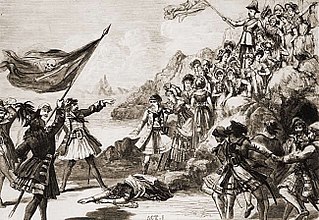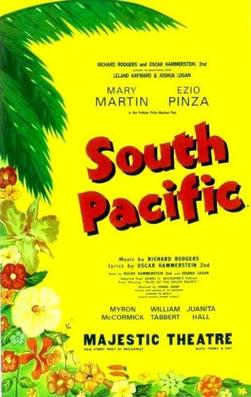
The Pirates of Penzance; or, The Slave of Duty is a comic opera in two acts, with music by Arthur Sullivan and libretto by W. S. Gilbert. Its official premiere was at the Fifth Avenue Theatre in New York City on 31 December 1879, where it was well received by both audiences and critics. Its London debut was on 3 April 1880, at the Opera Comique, where it ran for 363 performances.

South Pacific is a musical composed by Richard Rodgers, with lyrics by Oscar Hammerstein II and book by Hammerstein and Joshua Logan. The work premiered in 1949 on Broadway and was an immediate hit, running for 1,925 performances. The plot is based on James A. Michener's Pulitzer Prize–winning 1947 book Tales of the South Pacific and combines elements of several of those stories. Rodgers and Hammerstein believed they could write a musical based on Michener's work that would be financially successful and, at the same time, send a strong progressive message on racism.

Florodora is an Edwardian musical comedy. After its long run in London, it became one of the first successful Broadway musicals of the 20th century. The book was written by Jimmy Davis under the pseudonym Owen Hall, the music was by Leslie Stuart with additional songs by Paul Rubens, and the lyrics were by Edward Boyd-Jones, George Arthurs and Rubens.

"The Miller's Tale" is the second of Geoffrey Chaucer's Canterbury Tales (1380s–1390s), told by the drunken miller Robin to "quite" "The Knight's Tale". The Miller's Prologue is the first "quite" that occurs in the tales.

"The Wife of Bath's Tale" is among the best-known of Geoffrey Chaucer's Canterbury Tales. It provides insight into the role of women in the Late Middle Ages and was probably of interest to Chaucer himself, for the character is one of his most developed ones, with her Prologue twice as long as her Tale. He also goes so far as to describe two sets of clothing for her in his General Prologue. She holds her own among the bickering pilgrims, and evidence in the manuscripts suggests that although she was first assigned a different, plainer tale—perhaps the one told by the Shipman—she received her present tale as her significance increased. She calls herself both Alyson and Alys in the prologue, but to confuse matters these are also the names of her 'gossib', whom she mentions several times, as well as many female characters throughout The Canterbury Tales.

A Chorus Line is a 1975 musical with music by Marvin Hamlisch, lyrics by Edward Kleban, and a book by James Kirkwood Jr. and Nicholas Dante.

The Gielgud Theatre is a West End theatre, located on Shaftesbury Avenue, at the corner of Rupert Street, in the City of Westminster, London. The house currently has 986 seats on three levels.

Saint Cecilia, also spelled Cecelia, was a Roman virgin martyr and is venerated in Catholic, Orthodox, Anglican, and some Lutheran churches, such as the Church of Sweden. She became the patroness of music and musicians, it being written that, as the musicians played at her wedding, Cecilia "sang in her heart to the Lord". Musical compositions are dedicated to her, and her feast, on 22 November, is the occasion of concerts and musical festivals. She is also known as Cecilia of Rome.

"The Nun's Priest's Tale" is one of The Canterbury Tales by the Middle English poet Geoffrey Chaucer. Composed in the 1390s, it is a beast fable and mock epic based on an incident in the Reynard cycle. The story of Chanticleer and the Fox became further popularised in Britain through this means.

The Canterbury Tales is a 1972 Italian film directed by Pier Paolo Pasolini based on the medieval narrative poem by Geoffrey Chaucer. The second film in Pasolini's "Trilogy of Life", preceded by The Decameron and followed by Arabian Nights, it won the Golden Bear at the 22nd Berlin International Film Festival.

Paul Nicholas is an English actor and singer, best known for his work in the 1983 BBC sitcom Just Good Friends. The show won a BAFTA and Nicholas was nominated for best comedy performance.

The Beauty of Bath is a musical comedy with a book by Seymour Hicks and Cosmo Hamilton, lyrics by C. H. Taylor and music by Herbert Haines; additional songs were provided by Jerome Kern, F. Clifford Harris (lyrics) and P. G. Wodehouse (lyrics). Based loosely on the play David Garrick, the story concerns a young woman from a noble family, who falls in love with an actor. She then meets a sailor who appears identical to the actor and mistakes him for the latter. Her father objects to a marriage with the actor, but when it turns out that she really loves the sailor, all objections fall away.

Her Majesty's Theatre is a 1,700-seat theatre in Melbourne's East End Theatre District, Australia. Built in 1886, it is located at 219 Exhibition Street, Melbourne. It is classified by the National Trust of Australia and is listed on the Victorian Heritage Register.

Jenny Runacre is a South African actress. Her film appearances include The Passenger (1975), The Duellists (1977), Jubilee (1978), The Lady Vanishes (1979), and The Witches (1990).

The Marriott Theatre in Lincolnshire, Illinois is a respected Chicago area regional theatre. Attached to the Marriott Lincolnshire Resort, the theatre produces an average of five musicals each year, presented in the round, as well as productions aimed at younger audiences. A small, live orchestra provides accompaniment.

The Casino Theatre was a Broadway theatre located at 1404 Broadway and West 39th Street in New York City. Built in 1882, it was a leading presenter of mostly musicals and operettas until it closed in 1930.

The Girl from Utah is an Edwardian musical comedy in two acts with music by Paul Rubens, and Sidney Jones, a book by James T. Tanner, and lyrics by Adrian Ross, Percy Greenbank and Rubens. The story concerns an American girl who runs away to London to avoid becoming a wealthy Mormon's newest wife. The Mormon follows her to England, but she is rescued from a bigamous marriage by a handsome actor.

Havana is an Edwardian musical comedy in three acts, with a book by George Grossmith, Jr. and Graham Hill, music by Leslie Stuart, lyrics by Adrian Ross and additional lyrics by George Arthurs. It premiered on 25 April 1908 at the Gaiety Theatre, London, starring Evie Greene as Consuelo, W. H. Berry as Reginald Brown, Lawrence Grossmith as Don Adolfo and Mabel Russell as Pepita. A young Gladys Cooper was in the chorus.

Kissing Time, and an earlier version titled The Girl Behind the Gun, are musical comedies with music by Ivan Caryll, book and lyrics by Guy Bolton and P. G. Wodehouse, and additional lyrics by Clifford Grey. The story is based on the 1910 play, Madame et son Filleul by Maurice Hennequin, Pierre Véber and Henry de Gorsse. The story is set in contemporary France, with a glamorous actress at the centre of a farcical plot of imposture, intrigue and mistaken identity.

Tickle Me was a Broadway musical comedy in two acts with book and lyrics by Oscar Hammerstein II, Otto Harbach and Frank Mandel and music and musical direction provided by Herbert Stothart. Tickle Me was produced by Arthur Hammerstein and opened at the Selwyn Theater on August 17, 1920 and closed after 207 performances on February 12, 1921. The musical then embarked on a successful road tour with a schedule that extending well into the spring of the following year.




















